Floating the Iraqi dinar…a solution to fill the “gap” of its troubled price against the dollar
Floating the Iraqi dinar…a solution to fill the “gap” of its troubled price against the dollar
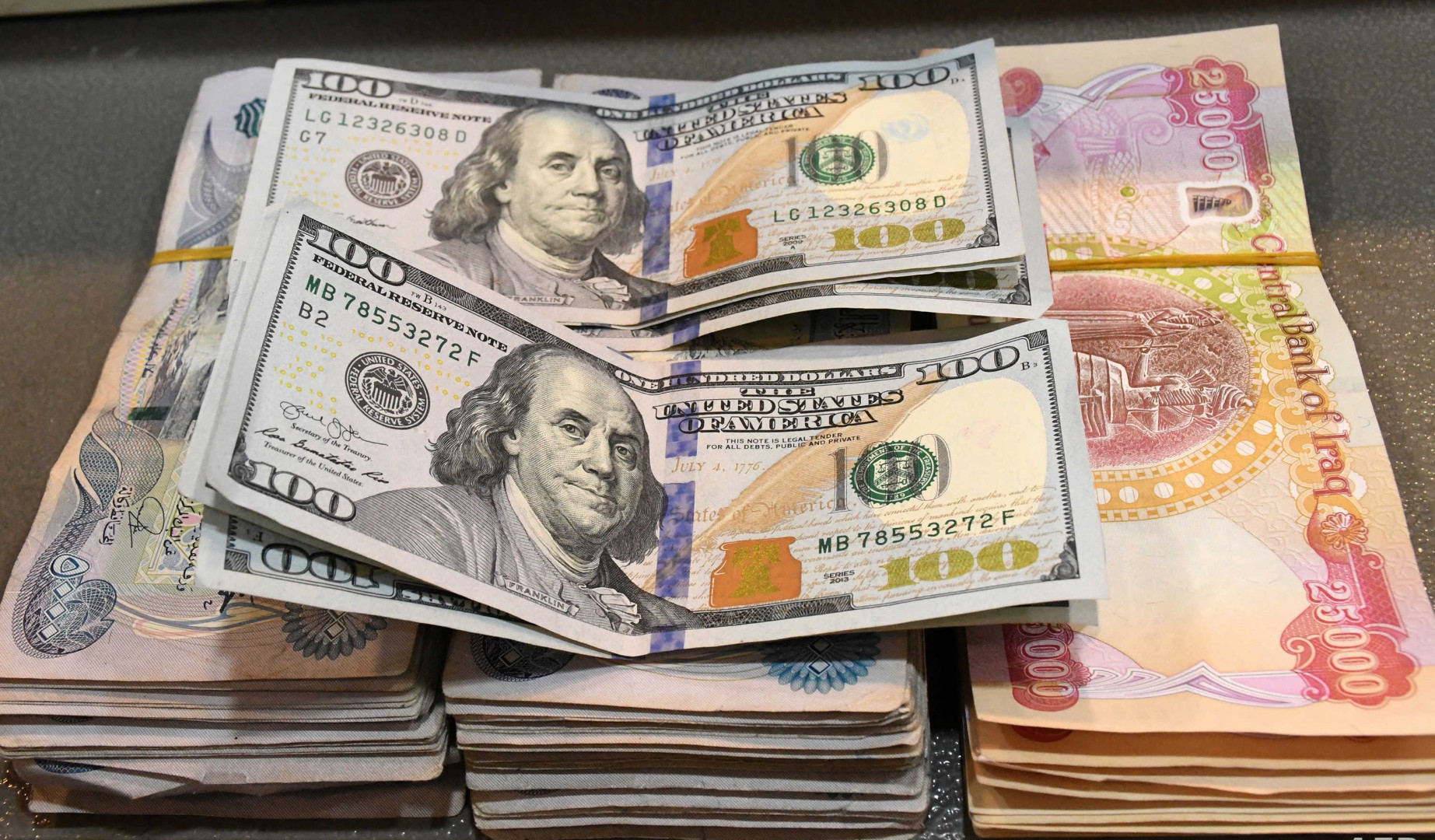 Shafaq News / The stability of the Iraqi dinar has been facing major challenges for years, as it has witnessed price fluctuations that have not stabilized, especially with the rapid rise and very slow decline of the price of the dollar, in addition to a gap between what the Iraqi Central Bank determines and what is sold in the parallel market, especially in banking shops that do not adhere to According to the instructions of the Central Bank.
Shafaq News / The stability of the Iraqi dinar has been facing major challenges for years, as it has witnessed price fluctuations that have not stabilized, especially with the rapid rise and very slow decline of the price of the dollar, in addition to a gap between what the Iraqi Central Bank determines and what is sold in the parallel market, especially in banking shops that do not adhere to According to the instructions of the Central Bank.
In order to avoid the “volatility” syndrome and the “gap” in the price of the Iraqi dinar against foreign currencies, some experts believe that the solution lies in a kind of “surgical” operation for the country’s monetary system that may be painful, but it achieves long-term monetary stability for the national currency through… “float”.
The cash selling price, according to the Central Bank, is 1,305 dinars per dollar, while the price for transfers abroad is 1,310 dinars per dollar, and the price in the parallel market is about 1,450 dinars per dollar in mid-May, according to local media, while it reached levels of 1,600 dinars per dollar in previous periods.
For months, the Iraqi authorities have imposed restrictions in their efforts to control exchange rates, restricting all commercial transactions within the country to the Iraqi dinar, and established a new mechanism that subjects external transfers to greater scrutiny.
Iraqi economic analysts who spoke to Al-Hurra website, some of them warned against taking a decision that would lead to floating the dinar, while some of them believe that a moderate policy could be taken that suits the Iraqi economy, based on “floating” and “stabilization” at the same time.
Is the flotation policy compatible with the Iraqi economy?
Advisor to the Prime Minister for Financial Affairs, Mazhar Salih, believes that floating the currency price does not suit the Iraqi economy, especially since it is a “rentier economy, dominated by foreign currency reserves.”
He explains in statements to the “Al-Hurra” website that “the economic vision that wants to float the Iraqi dinar to end the gap between the official price and the parallel price may be possible in an economy in which the free market alone influences the movement of the balance of payments, and not in an economy in which the rentier government sector is dominant and generates reserves.” Foreign currency”.
He added, “The monetary authority in Iraq alone is the main source of supply of foreign currency that meets the desired demand for foreign exchange in the local market.”
Saleh believes that the demands for flotation inevitably mean “adopting the prevailing exchange rate in the parallel market, in order to achieve the goal of stability and balance in the official exchange rate itself at a new exchange point that the market will reach at the end of the assumed flotation policy and return to stability again.”
The flotation scenario also means “the withdrawal of the monetary authority as the main central offerer of foreign currency, and its replacement by new forces of free market makers, which certainly have only a weak, limited supply of foreign exchange,” according to Saleh.
He points out that these forces carry “an uncontrolled package of inflationary expectations, and are called in the economic literature (the forces generating inflationary expectations), which will give dominance to the supply forces of speculators” who own limited amounts of foreign exchange, matched by “an open demand for foreign currency from Market side” exceeds what is offered by “at least more than ten times in our estimate.”
Chancellor Saleh described this policy as “unruly,” as as long as “the central government supply of foreign currency will be absent from the market, we will not obtain any equilibrium point in the exchange rate that flotation seeks except with a widespread deterioration of the exchange rate as long as it is carried out by forces generating inflationary expectations in a severe rentier economy.” “unilateralism.”
He warns that if the exchange rate moves in “a market that is incomplete, in terms of productivity, in its compensation for the required supply of goods and services,” no one “will know how much the new exchange rate resulting from the flotation will be,” which will be accompanied by “a prior wave of inflationary expectations,” the trends of which are difficult to control. Which may push monetary policy makers to “intervene with excessive foreign reserves and unjustified waste in foreign exchange to impose a state of stability.”
According to the World Bank, Iraq has 145 billion barrels of proven oil reserves, which are among the largest crude oil reserves in the world.
But Iraq hopes that the country’s oil reserves will exceed 160 billion barrels, according to what the Minister of Oil, Hayyan Abdul Ghani, recently announced.
What if the Iraqi dinar was floated?
The claims that have appeared every now and then for years calling for floating the exchange rate of the Iraqi dinar are “strange,” and most of them are made by people who are “not specialized in economics or monetary policy,” according to what Professor of International Economic Relations, Abdul Rahman al-Mashhadani, confirms to the Al-Hurra website.
He asserts in a decisive tone, “Iraq cannot proceed with floating the dinar’s exchange rate. The evidence for this is all the agreements concluded with the International Monetary Fund since 2004, and the reviews praised the stabilization of the exchange rate by the Central Bank of Iraq.”
Al-Mashhadani added that there was a study by experts at the World Bank during the past years that recommended “raising the exchange rate,” noting that even then, “these recommendations cannot be taken into account because the World Bank is concerned with what is related to economic development, but following up on the recommendations for monetary policies is taken into account if It was from the International Monetary Fund.
In its latest review on Thursday, the International Monetary Fund praised the efforts of the Central Bank of Iraq to tighten monetary policy and strengthen its liquidity management framework.
He explains that “the real gap is in the wheel of production in the Iraqi economy, as the majority of goods are imported from abroad, which means that the flotation will cause a spiral in price rates to become significantly high and affect the marginalized classes,” indicating that such a decision cannot be taken “as a matter of politics.” “Cash” only, as we must “consider the burdens it will impose on citizens.”
Al-Mashhadani confirms that what has been applied in other Arab countries does not “mean that it can be applied to the Iraqi economy,” suggesting that “the exchange rate will become at the levels of 5,000 dinars to the dollar,” as “the Central Bank has lost control over exchange rates, leaving them to float.”
There is a fear that “floating” will cause “social” problems, as “salaries will erode significantly,” which may threaten “new classes to slide into poverty,” while “a class of merchants, politicians, and businessmen will benefit, who will benefit from the state of instability that will result from… This matter”.
Al-Mashhadani agrees that floating in the end means “that the parallel market will control exchange rates,” but it will not achieve “the desired monetary stability,” as the central bank will then need to “print more local currency to keep up with demand in the markets,” and the government will need to increase salaries and allocations for aid packages. Social.
The Iraqi government advisor, Saleh, attributes the reason and existence of a “gap” in the dinar’s exchange rates against the dollar between the official and parallel markets to “external factors imposed by the compliance platform and auditing administrative restrictions on external transfer movements, which is not related to the deficit in the authority’s monetary reserves,” noting that the reserve Iraq’s foreign currency is considered the highest in the country’s history, as it touches the levels of import coverage for 16 months, compared to the global standard, which does not exceed three months of import coverage.
Financial transfers in dollars through official channels have increased significantly in Iraq, while Iraq continues its reforms of the financial sector in line with international standards, according to a previous report by Agence France-Presse.
In late 2022, the Iraqi banking sector adopted the SWIFT electronic transfer system with the aim of providing better control over the use of the dollar, ensuring compliance with US sanctions on Tehran, and also in order to limit the prosperity of the informal economy.
The financial standards that were adopted encouraged the emergence of a parallel market for currencies, attracting those seeking to obtain dollars outside official channels.
Saleh pointed out that there is a distortion in support for the prices of some commodities “on the part of financial policy, which is support in which the rich and poor mostly enjoy it equally without discrimination, and it represents an added, imperceptible real income, and it is the product of a financial policy inherited from the consumer welfare state for the rentier resource.”
He continued, “It is inconceivable until this moment that 90 percent of Iraq’s population is receiving food support provided by the state as an extension of the economic blockade phase of the 1990s, in light of the changing standards of living and lifestyle, the increasing number of affluent people, and the growth of the middle class.”
Shafaq.com
Follow us on DinarUpdates!!
Follow us on DinarUpdates:
on Twitter – @DinarUpdates – https://twitter.com/DinarUpdates
http://DinarUpdates.com/blog – The BLOG (Dinar news articles)
http://Dinarupdates.com/observer – The OBSERVER (Dinar guru commentaries)
…and of course on FaceBook:
Iraq confirms full payment of its debts to the IMF
Iraq confirms full payment of its debts to the IMF
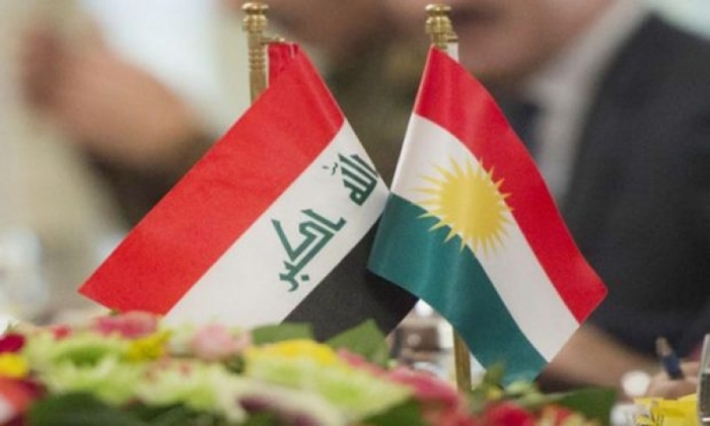 The Advisor to the Iraqi Prime Minister for Financial Affairs, Mazhar Salih, revealed the loans provided by the International Monetary Fund to Iraq since 2003, while noting that their total did not exceed 8 billion dollars, confirming that they were repaid in full….
The Advisor to the Iraqi Prime Minister for Financial Affairs, Mazhar Salih, revealed the loans provided by the International Monetary Fund to Iraq since 2003, while noting that their total did not exceed 8 billion dollars, confirming that they were repaid in full….
Faceiraq.org
Economic Institution: The value of China’s exports to Iraq increased by 93% in 10 years
Economic Institution: The value of China’s exports to Iraq increased by 93% in 10 years
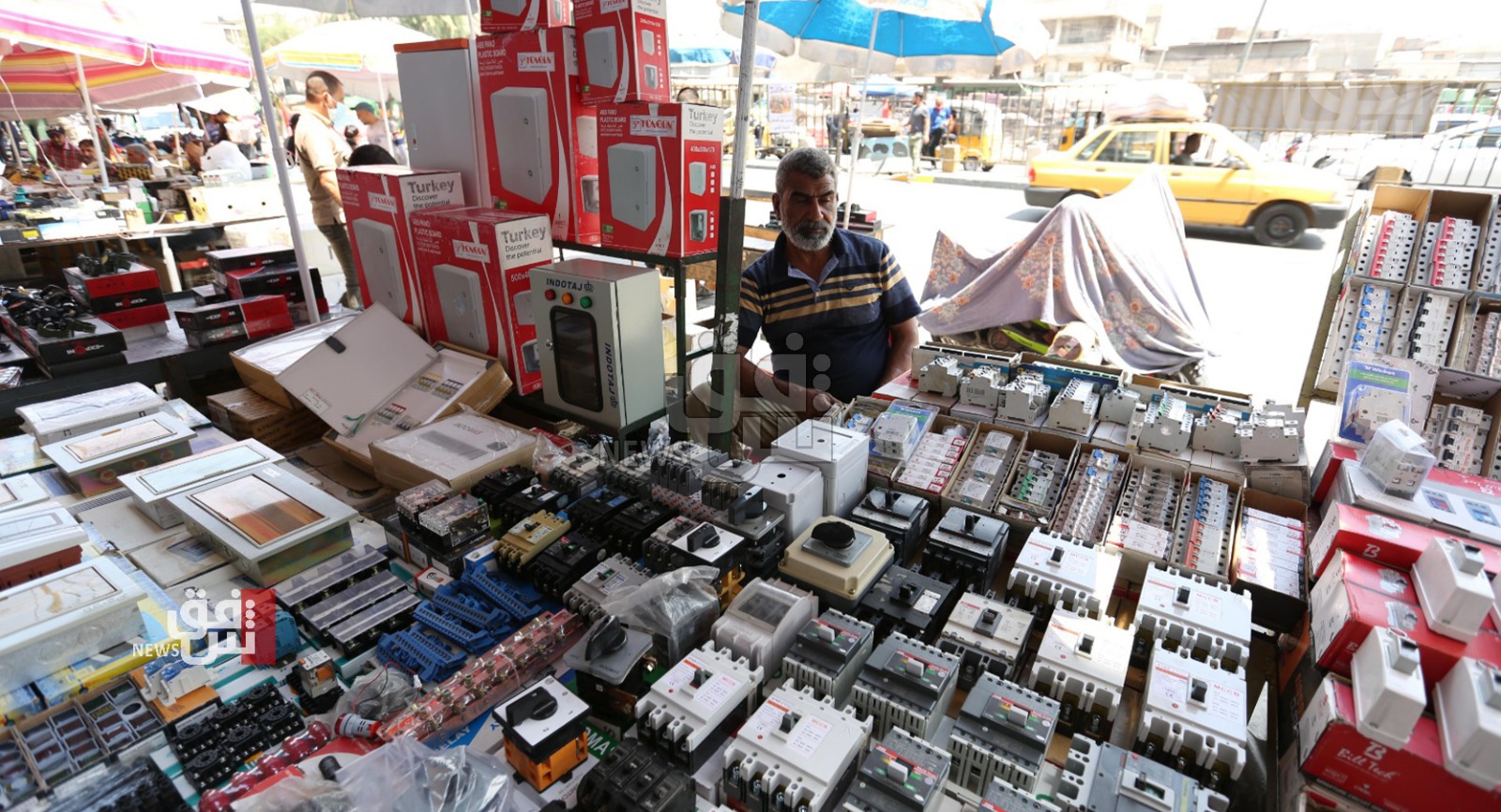
Shafaq News/ The “Future Iraq” Foundation for Economic Studies and Consultations reported on Saturday that the value of Chinese exports of direct goods to Iraq increased by 93% during ten years extending from 2015 to 2024, warning that this significant increase in imports will bring the country to The stage of its inability to cover the increasing demand for foreign currency.
According to a report published by the corporation today, the total value of direct Chinese exports to Iraq in 2015 amounted to 7.9 billion US dollars, while it is expected to reach the end of 2024, according to data for the first months of the current year, at a value of 15.3 billion US dollars.
The report said that exports of mechanical devices and equipment, which mainly include (air conditioning and refrigeration equipment), which represent 20% of China’s total exports to Iraq, increased by 162%, as in 2015 they represented a value of 1.4 billion US dollars, while they are expected to arrive in By the end of 2024, it reached more than 3.7 billion US dollars.
Exports of electrical appliances, which represent 14% of the total value of Chinese exports to Iraq, also increased by 77%, as they represented a value of one billion US dollars in 2015, and are expected to reach 1.9 billion dollars by the end of 2024, according to the corporation’s report.
The report indicated that the greatest growth was in China’s iron and steel exports, as the growth rate reached 280% compared to 2015, when the value of China’s iron exports to Iraq amounted to 131 million US dollars, and it is expected that by the end of 2024 it will reach a value of 500 million US dollars.
China’s exports of rubber materials, specifically tires, also increased by 195%, as the value of China’s exports in 2015 was $151 million, while they are expected to reach $446 million at the end of 2024, according to the report.
The Corporation attributed this increase in Chinese exports to several reasons, namely, the increased demand for various goods as a result of the increasing population growth and the expansion of construction in various Iraqi cities, as well as the fact that many Chinese goods were not shipped directly from China, but rather from other countries and were now exported directly from China.
Among those reasons mentioned in the report are the re-export of many goods exported to Iraq to other countries and their use in the barter system with those countries, especially countries with which banking is prohibited, and the change in the consumption pattern of the Iraqi consumer.
The corporation went on to review these reasons, and said, and pointed to the direct Chinese investments of Chinese companies in various sectors, which contributed to limiting the imports of some goods, such as iron and steel, from the Chinese side, in addition to the entry of the Chinese side into competition with some goods in which it did not have large market shares. Such as cars and telephones, with global inflation rates that led to a rise in global commodity prices.
The report warned that, according to these growth rates, it is expected that the volume of Iraq’s exports from China alone by the end of 2030 will reach approximately 20 billion US dollars, warning that this significant increase in imports will bring Iraq to the point of being unable to cover all this increasing demand from Foreign currency, especially if Iraq’s oil exports to China have remained stable at daily rates amounting to only 1.1 million barrels over the past five years, and there is uncertainty about the continuation of oil prices at current rates.
In its report, the institution expected that the trade balance would shift from a positive balance in favor of Iraq to a positive balance in favor of China in the coming years, stressing that it is necessary to activate trade exchange mechanisms with China through which reliance is placed on creating a reserve fund in which a portion of sales funds will be placed. Iraqi oil to China, and it is used to cover imports from China instead of the complex mechanism that occurs now.
The report concluded that it is necessary to work on analyzing these imports, and try to reduce some of them by transferring part of the manufacturing or assembly to inside Iraq, to reduce the added value that Chinese factories place on their products, and thus reduce the value of imports from China, specifically in the most important goods. Such as mechanical and electrical devices, tires, and the like.
shafaq.com
Al-Fateh calls for diplomatic action to end the UNAMI file in Iraq
Al-Fateh calls for diplomatic action to end the UNAMI file in Iraq
Information / Baghdad… On Saturday, the leader of the Al-Fatah Alliance, Ali Hussein Al-Fatlawi, called for diplomatic action to end the UNAMI file in Iraq.
Al-Fatlawi told Al-Maalouma, “The United States’ rejection of Iraq’s request submitted to the United Nations to end the mission of the United Nations UNAMI mission is not a final decision, indicating that the decision is still under discussion, but it needs intensive diplomatic action with the United States of America to change its position on the request.”.
He added, “Iraq requested the end of the United Nations mission, UNAMI, against the backdrop of the mission’s request to end its mission due to security and political stability.”
He added, “The United States of America is not the guardian of the United Nations, as the Iraqi request received the support of the majority of the members of the UN Security Council.”
Last Thursday, the United States of America rejected an Iraqi request to end the mission of the United Nations Assistance Mission for Iraq (UNAMI) next year.
Almaalomah.me
Iraqi Dinar / US Dollar auction results for today 5-09-2024
Iraqi Dinar / US Dollar auction results for today 5-09-2024
Results of the foreign currency selling window for Thursday 5/09/2024
 Advertisement No. (5121)
Advertisement No. (5121)
The amount:
Total amounts of transfers abroad (transfers, credits)
265,878,794
Total cash withdrawals
14,800,000
Total total sales
280,678,794
Note that: The selling price of documentary credits and international settlements for electronic cards is ( 1310 ) dinars per dollar.
The selling price for transfer amounts abroad is ( 1310 ) dinars per dollar.
The cash selling price is ( 1305 ) dinars per dollar.
The Iraqi Parliament enters its legislative recess and requires holding an “extraordinary” session on two matters
The Iraqi Parliament enters its legislative recess and requires holding an “extraordinary” session on two matters
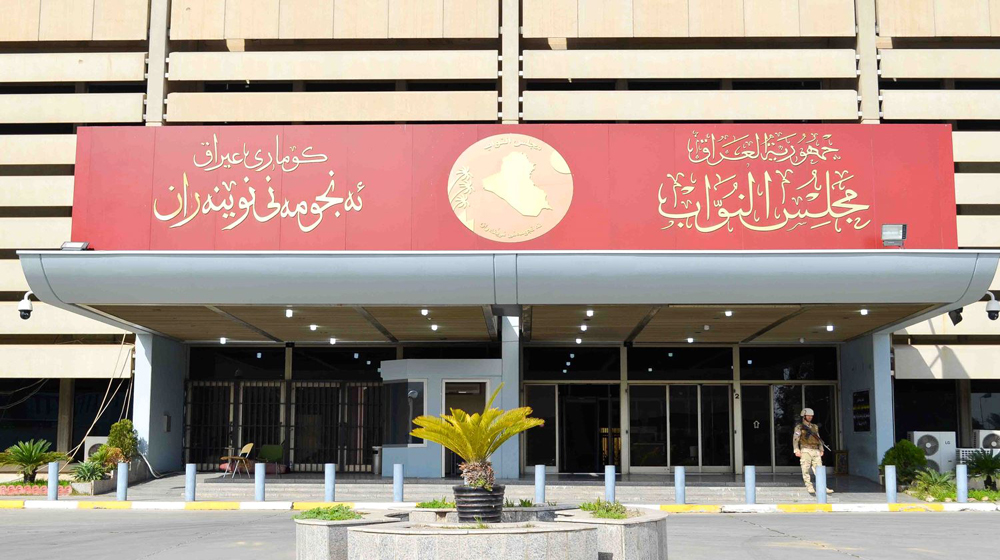 Shafaq News / A member of the Iraqi Parliament announced, on Thursday, that the House of Representatives will enter its legislative recess, starting tomorrow, Friday.
Shafaq News / A member of the Iraqi Parliament announced, on Thursday, that the House of Representatives will enter its legislative recess, starting tomorrow, Friday.
Member of the Parliamentary Legal Committee, Raed Al-Maliki, told Shafaq News Agency, “Today, Thursday, the House of Representatives ended the first legislative term of the third legislative year, and starting tomorrow, Friday, the House will enjoy the legislative recess until next June.”
He explained, “The second legislative term will begin next June 9, and therefore the House of Representatives will enjoy the legislative recess for only one month.”
He pointed out, “If the position of Speaker of the House of Representatives is agreed upon or the budget tables are sent to the House, Parliament will hold an extraordinary or emergency session to discuss any important event during the legislative recess.”
The Shiite coordinating framework announced, after a meeting in Maliki’s office on Monday, its intention to hold a session dedicated to choosing a speaker for Parliament after the expiry of a deadline it set (one week), at a time when three Sunni alliances announced their support for the framework’s position.
Shafaq.com
The head of the movement denies any Iraqi-American negotiations to remove the coalition
The head of the movement denies any Iraqi-American negotiations to remove the coalition
Information / Baghdad… Today, Thursday, the head of the Wojood movement, Muhammad Abu Saeeda, denied the existence of any Iraqi-American negotiations to withdraw the American-led coalition forces from Iraq.
Abu Saida told Al-Maalouma, “The Sudanese visit to Washington did not discuss this file, but it was agreed to reschedule these forces and change their description from forces to advisors, while reducing the number of foreign companies working to serve these forces inside the American bases or embassy.”
He promised, “Talk about the existence of understandings to remove these forces are nothing but statements for the sake of electoral projects,” indicating that “the occupier will not leave Iraq except by force.”
Almaalomah.me
Paying back the debt…the challenges and dangers of the Sudanese’s “daring” relationship with America
Paying back the debt…the challenges and dangers of the Sudanese’s “daring” relationship with America
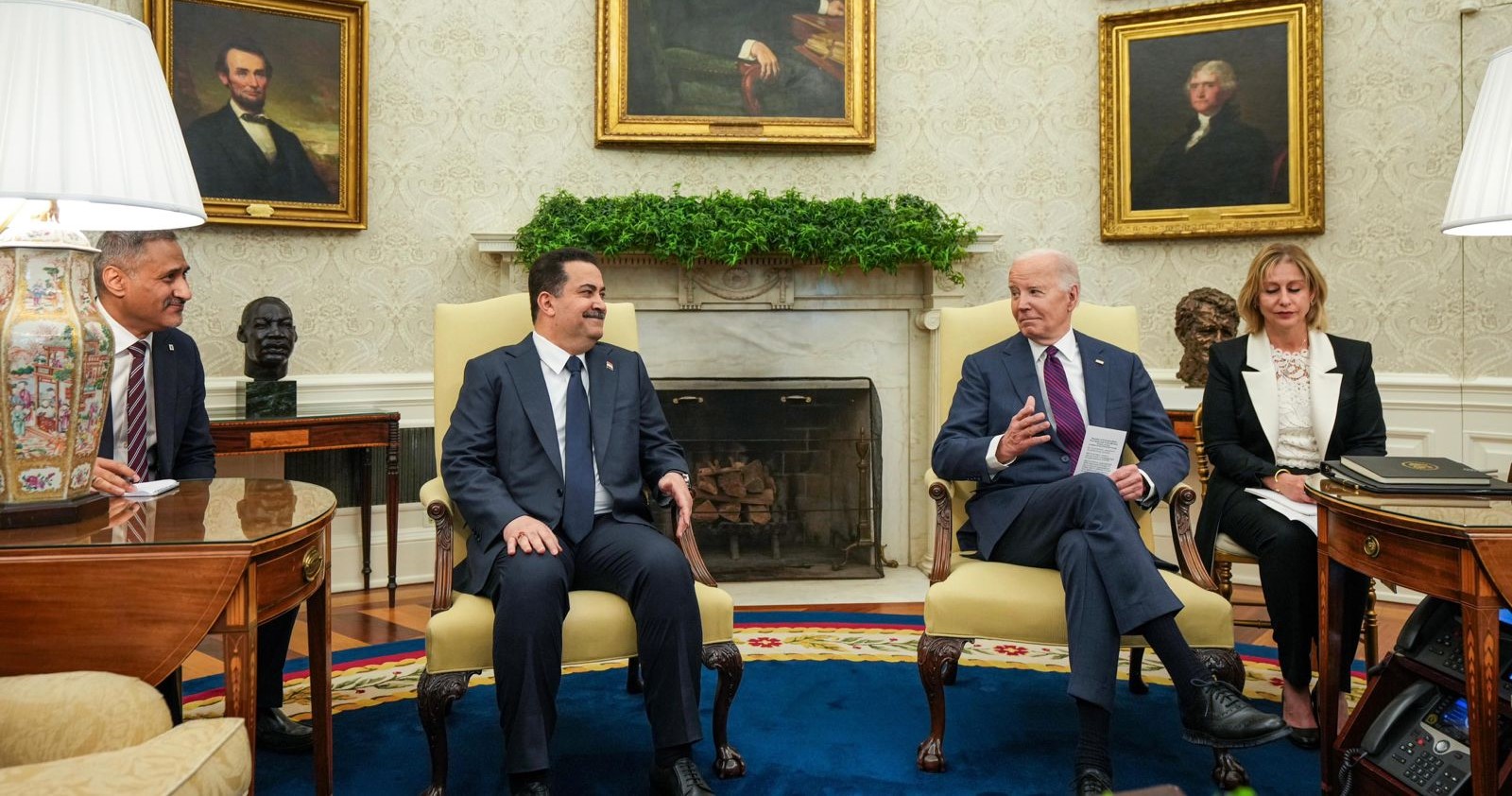 Shafaq News / The American “Arab Center in Washington” Institute identified the internal and external challenges and risks that stand in the way of Iraqi Prime Minister Muhammad Shiaa al-Sudani after his visit to Washington, D.C., during which he said that he seeks to “establish bold new relations” with the United States.
Shafaq News / The American “Arab Center in Washington” Institute identified the internal and external challenges and risks that stand in the way of Iraqi Prime Minister Muhammad Shiaa al-Sudani after his visit to Washington, D.C., during which he said that he seeks to “establish bold new relations” with the United States.
The American report, translated by Shafaq News Agency, indicated that the Sudanese is in the middle of his term and has 18 months to achieve his vision regarding closer relations with the United States, or at least to put them on the right track. However, given the various pressures and the economic and security situation, his plans Ambition is not guaranteed in any case, as it is likely to face challenges from different sectors in the current political environment.
The report quoted American and Iraqi sources as saying that Al-Sudani’s visit was successful despite the preoccupation of President Joe Biden’s administration with the Gaza war and the Iranian attack on Iran on April 13.
The report pointed out that the political risks are great for Sudanese, as he owes his appointment in 2022 to the forces of the coordinating framework, which includes some militia forces condemned by Congress and which are demanding an end to the American presence in Iraq.
After the report referred to the intense meetings in which Al-Sudani participated during his American visit, it said that during his media interviews he seemed self-confident, clear-headed, and rarely proficient in facts and figures, in addition to that he was also disciplined during the interviews, including with CNN. America, where he maintained his composure, even though some of his responses were evasive and not convincing.
360 degree relationship
While the report pointed out that Al-Sudani explained, during his interviews and meetings, his vision of a “360-degree” relationship with the United States, and the many areas that he seeks to strengthen with Washington in energy, finance, health, environment, education, security, and others, it said that Al-Sudani portrayed Iraq as representing a ripe opportunity for investment. By American companies, especially in the field of energy and electricity.
However, the report said that the ambitious program proposed by Al-Sudani will face the operational and political realities in Iraq.
The report explained that in practice, Iraq does not suffer from deep-rooted corruption, bureaucracy, a fragmented decision-making process, a fragile financial sector, security risks, and a workforce that lacks the skills necessary to achieve international standards, indicating that the government is trying to address some of these challenges and that Some of them cannot be treated quickly, such as vocational readiness, which constitutes an obstacle to Western investment.
However, the report said that “more serious than that are the political challenges,” explaining that achieving a long-term partnership with the United States “requires a national political will that may not exist in Iraq at the present time.”
In this context, he pointed out the discrepancy between the positions of the coordination framework, which supported the Sudanese visit but demanded a commitment regarding the American withdrawal, while the State Administration Coalition supported the visit but did not shed light on the issue of the American presence.
He pointed out that the Kurds have always supported the establishment of strong relations with Washington, including security and military cooperation, as a guarantee of their security, adding that the Sunnis quietly support strong relations with Washington to be a counterweight to Iranian influence in Iraq.
Sudanese opposition
The report considered that the most serious opposition to Al-Sudani’s vision may come from some Shiite militias, specifically the factions within the Popular Mobilization Forces, which were targeting American interests in Iraq and Syria and claimed responsibility for attacks against Israel, as these factions are affected by Iran’s strategic calculations regarding the harm or benefits from The US-Iraqi partnership affects Iran’s regional interests.
The report warned that the events in the region, the most dangerous of which is the continuation of the war in Gaza or the open conflict with Hezbollah, will only strengthen the position of extremists who incite against the close relations between Iraq and the United States.
In this context, he recalled the position of the Rights Bloc, the political arm of Kataib Hezbollah, which demanded accountability for the results of the Sudanese-American visit, specifically with regard to the withdrawal of coalition forces.
The report suggested that other challenges facing the American partnership posed by Sudanese will come from his competitors, explaining that many Shiite leaders, motivated by their own ambitions and looking forward to the upcoming parliamentary elections, do not want Sudanese to achieve success, indicating that Sudanese is a partner. Small has no party base, while the coalition forces have chosen him to be an instrument of their will rather than an independent actor, and rivals will want to thwart him.
However, the report pointed out that the coalition forces are not all homogeneous, as they include pragmatists who support Al-Sudani’s vision because they hope to benefit from it, and there are those who oppose it for ideological reasons or competitive motives, in addition to others who are neutral.
He also added that many Shiite parties actually invest in the country and enjoy a large share of the economic pie, and they believe that through partnership with the United States, their share in it will expand.
Kurds and Sudanese
The report stated that in order to strengthen his position locally, the Sudanese, perhaps with the urging of the United States, made efforts to repair relations with the Kurds, despite the problems raised by the Iraqi courts regarding Kurdistan Region’s oil revenues, which the Kurds consider unfair and politically motivated.
The report continued that the two Kurdish parties, the Kurdistan Democratic Party and the Patriotic Union of Kurdistan, gave full support for Al-Sudani’s visit to Washington, and relations between Baghdad and Erbil have become better than they were months ago.
The report noted that Al-Sudani also met with leaders in the torn Sunni arena and began establishing projects in the Sunni stronghold of Anbar, while beginning to implement his social services program in order to gain popular acceptance. Popular, and therefore the Iraqi Prime Minister is trying to obtain support from outside the ruling coalition forces, to include other political parties and Iraqi voters.
The report added that Sudanese is also preoccupied with integrating Iraq into the regional economic fabric.
The American role
The report stated that since the signing of the Strategic Framework Agreement in 2008, and during three presidencies, the United States had considered Iraq to be nothing more than a security problem, and American policy was focused on security and military needs, but this narrow view is neither “sustainable” nor “ “permanent” and lacks the potential for economic, social and technological engagement.
The report added that implementing the broader mandate of the Strategic Framework Agreement has now become a necessity, not a luxury, for the two countries.
The report concluded by saying that there is no doubt that there are bureaucratic, political, and perhaps security factors that must be taken into account, including corruption, which is considered a major problem in Iraq.
He continued that the United States must look not only at the benefits of implementing the Unified Framework Agreement, but also at the costs of not implementing it, including the risks of instability in Iraq, the rising power of extremist groups that have regional repercussions, the growing Iranian influence, and the possible withdrawal from the country. Iraq is far from regional Arab politics and the possibility of it heading east towards Russia and China.
Shafaq.com
